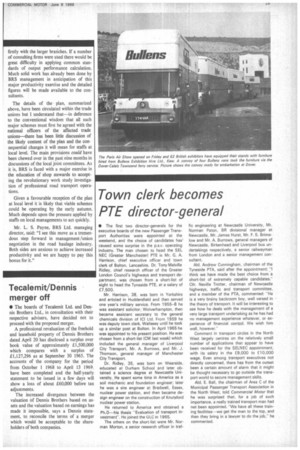Town clerk becomes PTE director-general
Page 31

If you've noticed an error in this article please click here to report it so we can fix it.
• The first two director-generals for the executive boards of the new Passenger Transport Authorities were appointed at the weekend, and the choice of candidates has caused some surprise in the p.s.v. operating industry. The man chosen to head the SEL NEC (Greater Manchester) PTE is Mr. G. A. Harrison, chief executive officer and town clerk of Bolton, Lancashire. Dr. Tony Melville Ridley, chief research officer of the Greater London Council's highways and transport department, was chosen from a short-list of eight to head the Tyneside PTE, at a salary of £7,500.
Mr. Harrison, 38, was born in Yorkshire and articled in Huddersfield and then served one year's military service. From 1955-8 he was assistant solicitor; Wolverhampton, then became assistant secretary to the general chemicals division of ICI Ltd. From 1959 he was deputy town clerk. Wallasey until he took up a similar post at Bolton. In April 1965 he was appointed to his present position. He was chosen from a short-list ICM last week) which included the general manager of Liverpool City Transport, Mr. A. Burrows, and Mr. J. Thomson, general manager of Manchester City Transport.
Dr. Ridley, 35, was born on Wearside, educated at Durham School and later obtained a science degree at Newcastle University. He spent some time in America as a soil mechanic and foundation engineer; later he was a site engineer at Bradwell, Essex, nuclear power station, and then became design engineer on the construction of Knutsford nuclear power station.
He returned to America and obtained a
Ph.D his thesis "Evaluation of transport investment". He joined the CiLC in 1965.
The others on the short-list were Mr. Nor man Morton, a senior research officer in traf
fic engineering at Newcastle University, Mr. Norman Paton, BR divisional manager at Newcastle, Mr. James Hurst, Mr. F. S. Brimelow and Mr. A. Burrows, general managers of Newcastle, Birkenhead and Liverpool bus undertakings respectively, a senior railwayman from London and a senior management consultant.
Aid. Andrew Cunningham, chairman of the Tyneside PTA, said after the appointment: "I think we have made the best choice from a short-list of extremely capable candidates," Cllr. Neville Trotter, chairman of Newcastle highways, traffic and transport committee, and a member of the PTA, commented: "He is a very brainy backroom boy, well versed in the theory of transport. It will be interesting to see how he deals with the management of a very large transport undertaking as he has had no management experience whatever, or experience of financial control. We wish him well, however."
Comment in transport circles in the North West largely centres on the relatively small number of applications that appear to have been received for the SELNEC appointment, with its salary in the £9,000 to £10,000 wage. Even among transport executives not directly concerned, there has from the outset been a certain amount of alarm that it might be thought necessary to go outside the transport world to secure management skills.
Ald. E. Ball, the chairman of Area C of the Municipal Passenger Transport Association in the North West, told Commercial Motor that he was surprised that, for a job of such importance, a really trained transport man had not been appointed. "We have all these training facilities—we get the men to the top, and then they bring in a lawyer to do the job," he commented.


























































































































